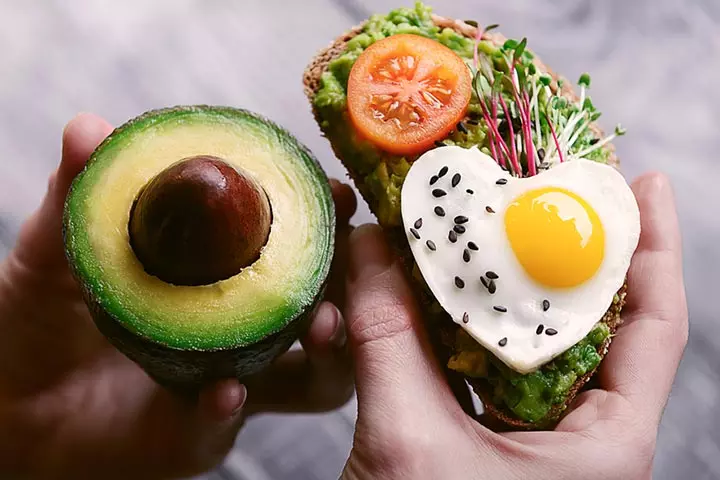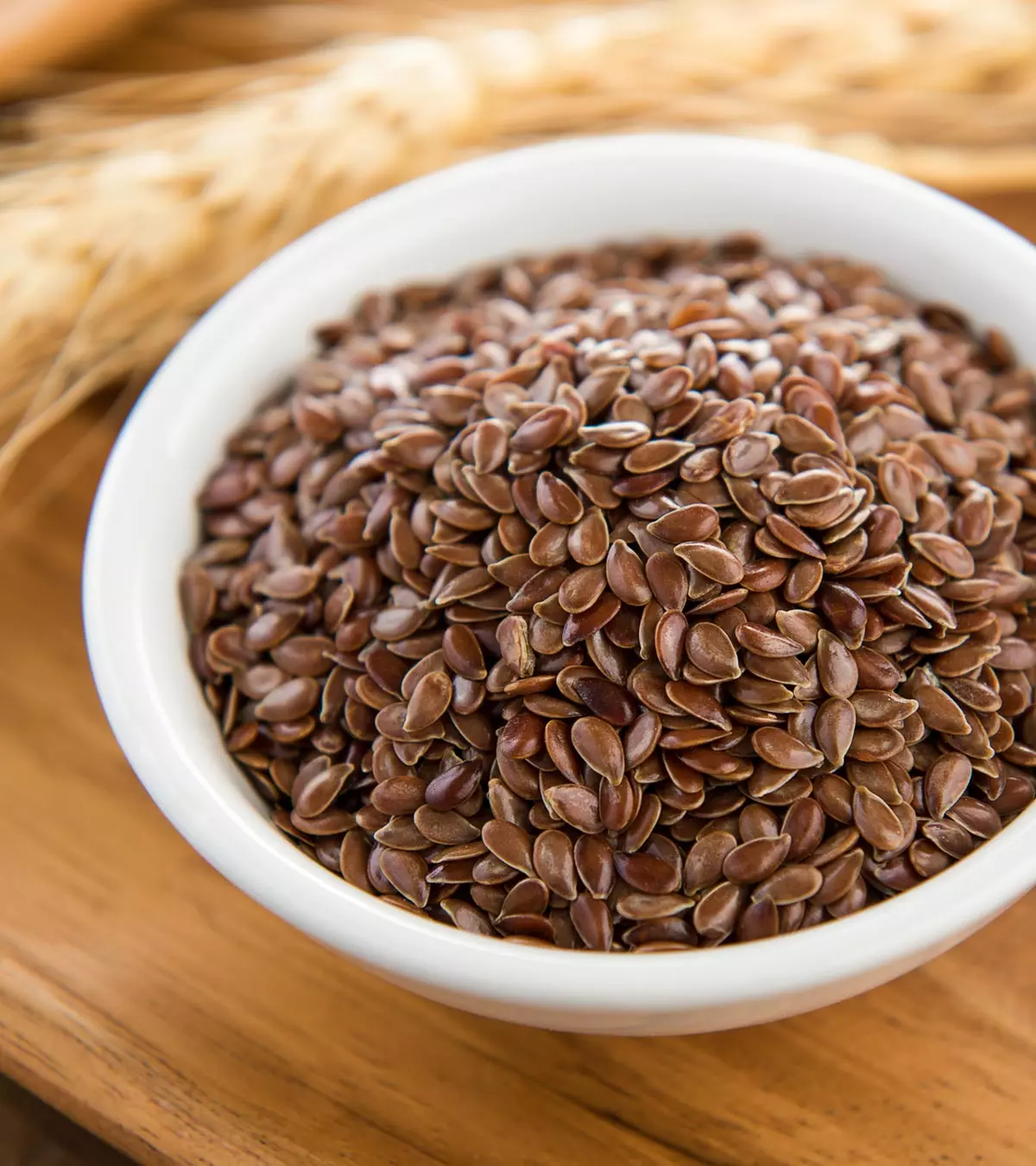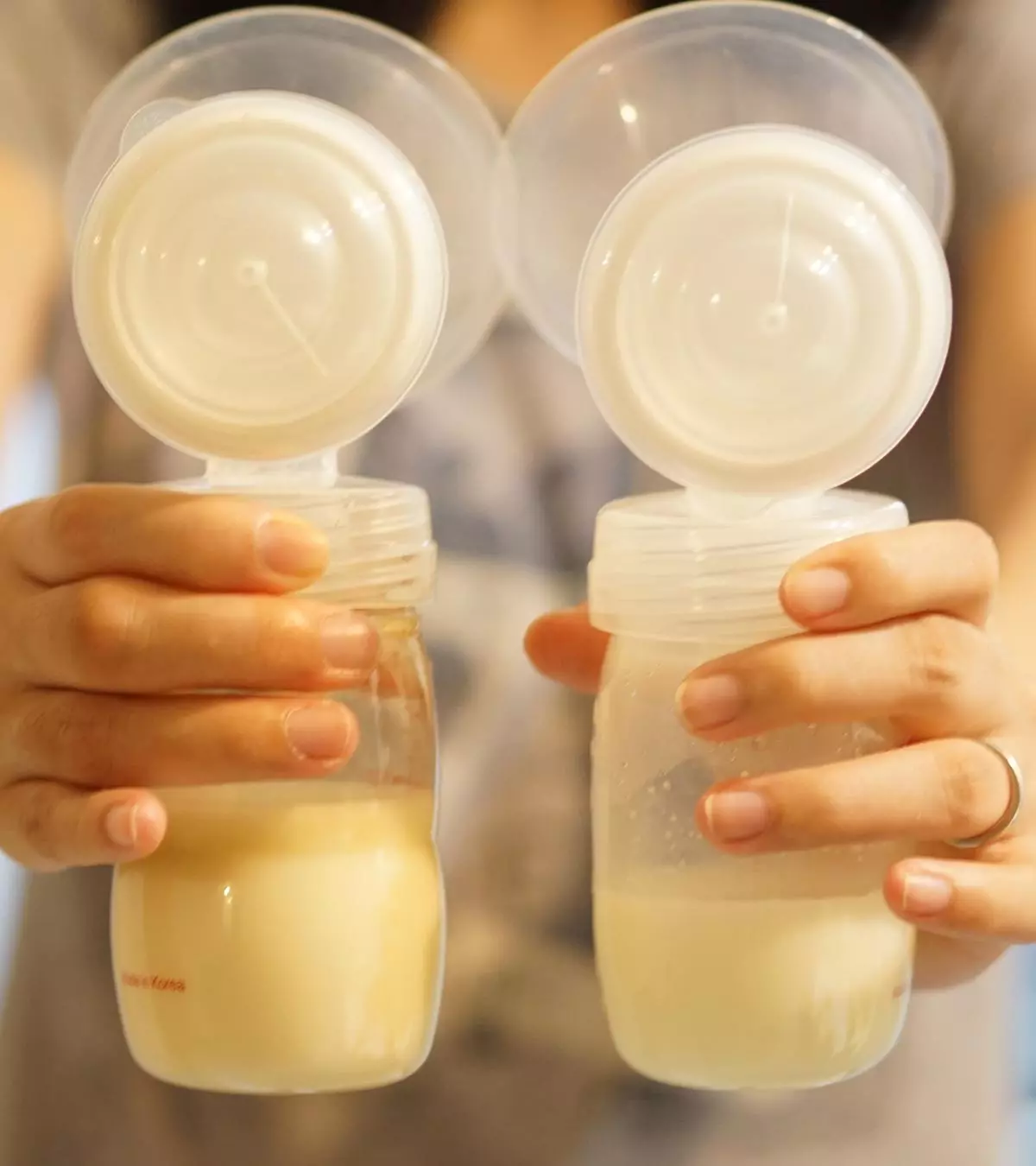
Image: iStock
Generally, eggs during breastfeeding make for a well-balanced maternal diet. Eggs are an excellent source of high-quality protein, vitamins, and essential lipids to help you meet your nutritional needs during nursing. But since they also fall under allergenic foods, you may feel apprehensive about eating eggs while you are breastfeeding.

However, you need to follow some precautions to ensure the safe ingestion of eggs during lactation. Read on as we tell you more about the safe intake of eggs during lactation, their possible health benefits, and their side effects.
Key Pointers
- Breastfeeding moms can eat hard-boiled, well-cooked eggs, but pasteurized eggs are recommended.
- Well-cooked eggs provide protein, nutrients, brain development support, liver function maintenance, anti-inflammatory, and antimicrobial properties.
- Breastfeeding moms with egg allergies or kidney problems may experience side effects from eating eggs, and infants may also develop egg allergies.
- To avoid Salmonella contamination, eggs should be fully cooked, raw or undercooked eggs/dishes should be avoided, and cooked eggs should be refrigerated within 2 hours.
Can Breastfeeding Moms Eat Eggs?

Nursing moms can eat well-cooked eggs, preferably those that are hard-boiled. Undercooked or raw eggs have a risk of salmonella contamination that can cause food poisoning while breastfeeding.
The US Food and Drug Administration (USFDA) recommends using pasteurized eggs as much as possible (1). However, you may also buy eggs stored in a refrigerator, provided they are clean and the shells are not cracked (2).
Health Benefits Of Eggs For Breastfeeding Moms

Consuming well-cooked eggs regularly during nursing might be beneficial for maternal health in the following ways.
- Provide high-quality proteins: Egg contains all the nine essential amino acids in the right proportions. It has a biological value of almost 100, which indicates that the maximum amount of its protein is absorbed by the body (3)
- Contain a variety of micronutrients: Eggs are rich in micronutrients, and several bioactive compoundsiMolecules with antioxidant properties and health-promoting effects present in plants and some foods that have health-benefiting properties (4). Some of these nutrients, such as vitamins A, B2, and B12, can also pass via breast milk, supporting infant health. The regular consumption of cooked eggs can help the mother recover from iron-deficiency anemia.
- Support brain development: Eggs are a good source of omega-3 fatty acids (DHA and EPA) that are required for brain and vision development (5) (6) (7).
- Maintain liver function: Egg yolk has considerable amounts of choline, which is an essential nutrient required by the mother and the nursing baby. The most vital functions of choline are supporting brain development and maintaining liver function (8) (9) (10).
- Have anti-inflammatory properties: Eggs contain bioactive compounds, such as sphingomyelin, lutein, and zeaxanthin that possess anti-inflammatory properties (5) Thus, some research studies indicate that an egg a day might be useful to fight against inflammation (11). This property may help in postpartum recovery.
- Possess antimicrobial properties: The egg contains proteins such as ovotransferrin, vitellogenin, lipovitellin, and phosvitin, which have antiviral and antibacterial properties (5). These properties could support the immune system.
- Have anti-oxidant properties: Eggs are a rich source of selenium. Selenium is a trace mineral that plays a crucial role in supporting the overall health of both the mother and the breastfeeding infant. This essential nutrient aids in the protection of cells from oxidative stress. In addition to this, selenium in eggs also plays an important role in thyroid hormone metabolism, DNA synthesis, and protection from infection (12).
- Maintain skin health: Collagen in eggs, a structural protein, plays an important role in the maintenance and repair of various tissues in the body, including the skin and connective tissues. Additionally, collagen is essential for the health of joints and ligaments, providing overall structural support (13). Hence, including eggs in the diet may contribute to meeting the increased collagen needs during breastfeeding.
 Research finds
Research findsPossible Side-Effects Of Eggs When Breastfeeding
Consuming eggs during the nursing phase does not necessarily cause side effects in healthy breastfeeding mothers
.
However, if you have any health issues, then there may be the risk of encountering the following side effects.
- Protein overload: It is not a common phenomenon, but may occur in individuals with kidney ailments. Eggs are a rich source of protein. High protein intake by those with kidney problems can cause detrimental effects (14).
- Allergy: Egg allergy is one of the most common food allergies. It develops when your immune system overreacts to proteins found in egg whites and/or yolks. According to Food Allergy Research and Education (FARE), about 2.7 million people in the US suffer from egg allergy (15). Egg allergy usually appears in infancy and resolves by adulthood, but not in all cases. If you are a breastfeeding mother with an existent egg allergy or any other food allergy, then do not consume egg without consulting a doctor.
 Did you know?
Did you know?
- Salmonella: Salmonella infection is another possible disadvantage of egg consumption.
Sometimes, maternal egg consumption can lead to egg allergy in babies. According to the American College of Allergy, Asthma & Immunology (ACCAI), the typical signs of an egg allergy that parents should keep an eye on are skin contact reactions, vomiting, stomach cramps, wheezing, diarrhea, redness of the face, and hivesiA skin rash characterized by itching triggered by allergic foods or medications around the mouth (16). In extreme cases, an egg allergy may cause breathing problems leading to anaphylaxisiAn extreme allergic reaction causing breathing difficulties and loss of consciousness .
If you have any other health condition, then consult a doctor before consuming eggs. If you are asked to avoid eggs, then you should also avoid products that contain eggs. Examples of foods that may contain eggs are cakes, mayonnaise, ice cream, salad dressings, hollandaise, and sauces.
How To Buy And Store Eggs?

You can buy and store eggs safely by following some simple guidelines and tips listed below.
Buying
- Prefer pasteurized eggs. If not, buy eggs that were stored in a refrigerator.
- While buying, ensure that the eggs are clean and the shells are not broken or cracked.
- Store the eggs in a refrigerator at 40°F (4°C) or below, but not in the freezer.
- It is advisable to store the eggs in their packaging and use them within three weeks.
When possible, opt for organic eggs as they are less likely to contain harmful chemicals and are often from hens that are raised in better conditions. This choice can provide peace of mind for breastfeeding mothers concerned about food quality.
Storing
It is best to consume fresh and nutrient-rich food during lactation. However, if you need to store eggs for long, then you should observe the following precautions.
- Hard cook the eggs in their shell. You may also peel them. However, in both cases, use these eggs within a week after cooking.
- Consume all the leftover cooked egg dishes within three to four days of their preparation.
- You can freeze eggs to use them for long, but do not store frozen eggs with their shells. Instead, beat yolks and whites together, and then freeze the mix. If required, egg white can be frozen separately.
- Frozen eggs can be consumed for a year. However, there may be a decline in their taste and nutritional value. Therefore, it is best to consume frozen eggs within a month or a few weeks from the date of their freezing.
Careful purchase and storage of eggs can minimize the chances of any complications.
Precautions To Take While Consuming Eggs When Breastfeeding

Eggs can be contaminated with Salmonella, a bacteria that can affect your health. Though it can’t pass to the baby via breast milk, staying alert against food-borne illnesses is crucial during breastfeeding. The Centers For Disease Control And Prevention (CDC) recommends taking the following precautions when adding eggs to the diet (2).
- Cook eggs until both the yolk and the whites are firm. Never consume raw eggs since they could harbor bacteria.
- Do not consume raw cookie dough recipes as they contain raw eggs and hence are risky.
- Avoid eating dishes that use raw or undercooked eggs such as eggs benedict.
- When preparing scrambled eggs, ensure that they are not runny.
- Some breastfeeding mothers might experience general indigestion while consuming half-fried eggs. In such a case, avoid eating them.
- Always cook dishes containing eggs, such as cookies, cakes, or sauces, to a temperature of at least 160°F (71°C).
- Never leave cooked eggs or egg dishes out of the refrigerator for more than two hours.
 Quick fact
Quick factFrequently Asked Questions
1. Does eating eggs while breastfeeding cause gas?
Yes. Eggs are one of the gassy foods. Hence you may experience gas from eating eggs during lactating, which, in turn, might make your breastfed baby gassy. However, before excluding eggs from your breastfeeding diet, you can consult with your doctor and look for signs of irritation in your baby (17).
2. How many eggs should a breastfeeding mom eat?
Breastfeeding moms may eat one egg a day and other proteinaceous foods to have the required daily protein intake (18).
3. Do eggs help with milk production?
Although there is a lack of scientific evidence supporting that eggs can increase milk supply, the CDC recommends that breastfeeding mothers incorporate food options high in iodine and choline (such as eggs) in their nursing diet (19).
Eggs are a good source of healthy fats and protein and are a wholesome and healthy food item. Nursing mothers often wonder if it is safe to consume eggs during breastfeeding. Eating eggs has several health benefits for lactating mothers. You can consult your nutritionist to know the safe quantity of eggs that you can consume to avoid health problems like protein overload or salmonella infection. Also, ensure you eat only fresh and well-stored eggs.
Infographic: Eggs When Breastfeeding: Safety Tips To Consider
Eggs are the storehouse of protein and energy and offer various health advantages for the mother and the baby. However, they can also be potentially allergenic. Therefore, you should always take precautions when eating eggs. Check out the infographic below for some important safety tips you should follow when relishing eggs during breastfeeding. Illustration: Momjunction Design Team
Increase your understanding of the advantages of eating eggs and make well-informed decisions for your well-being.
References
1. Dairy and Eggs from Food Safety for Moms to Be; USFDA
2. What You Need to Know About Egg Safety; USFDA
3. Jay R. Hoffman and Michael J. Falvo; Protein – Which is Best?; National Center For Biotechnology Information
4. Heqian Kuang et al.; The Impact of Egg Nutrient Composition and Its Consumption on Cholesterol Homeostasis; National Center For Biotechnology Information
5. Catherine J. Andersen; Bioactive Egg Components and Inflammation; National Center For Biotechnology Information
6. M. Anton et al.; Bioactive egg components and their potential uses; CABI
7. Agnieszka Bzikowska-Jura et al.; The Concentration of Omega-3 Fatty Acids in Human Milk Is Related to Their Habitual but Not Current Intake; National Center For Biotechnology Information
8. Choline; Oregon State University
9. Jung Eun Kim and Wayne W. Campbell; Dietary Cholesterol Contained in Whole Eggs Is Not Well Absorbed and Does Not Acutely Affect Plasma Total Cholesterol Concentration in Men and Women: Results from 2 Randomized Controlled Crossover Studies; National Center For Biotechnology Information
10. Schnohr P et al.; Egg consumption and high-density-lipoprotein cholesterol.; National Center For Biotechnology Information
11. Martha Nydia Ballesteros et al.; One Egg per Day Improves Inflammation when Compared to an Oatmeal-Based Breakfast without Increasing Other Cardiometabolic Risk Factors in Diabetic Patients; National Center For Biotechnology Information
12. Selenium; National Institutes of Health
13. What is the benefit of collagen in your diet?; Gundersen Health System
14. CKD Diet: How much protein is the right amount?; National Kidney Foundation
15. Facts and Statistics; Food Allergy Research & Education
16. Egg Allergy; ACAAI
17. Why Is My Baby So Gassy?; RMC Health System
18. Tips for breastfeeding moms; United States Department of Agriculture
19. Maternal Diet and Breastfeeding; CDC
20. Juliet Gray; (2019); Egg consumption in pregnancy and infancy: Advice has changed; Journal Of Health Visiting
Community Experiences
Join the conversation and become a part of our nurturing community! Share your stories, experiences, and insights to connect with fellow parents.
Read full bio of Charmaine Dominguez
Read full bio of Swati Patwal
Read full bio of Rohit Garoo
Read full bio of Shinta Liz Sunny
















